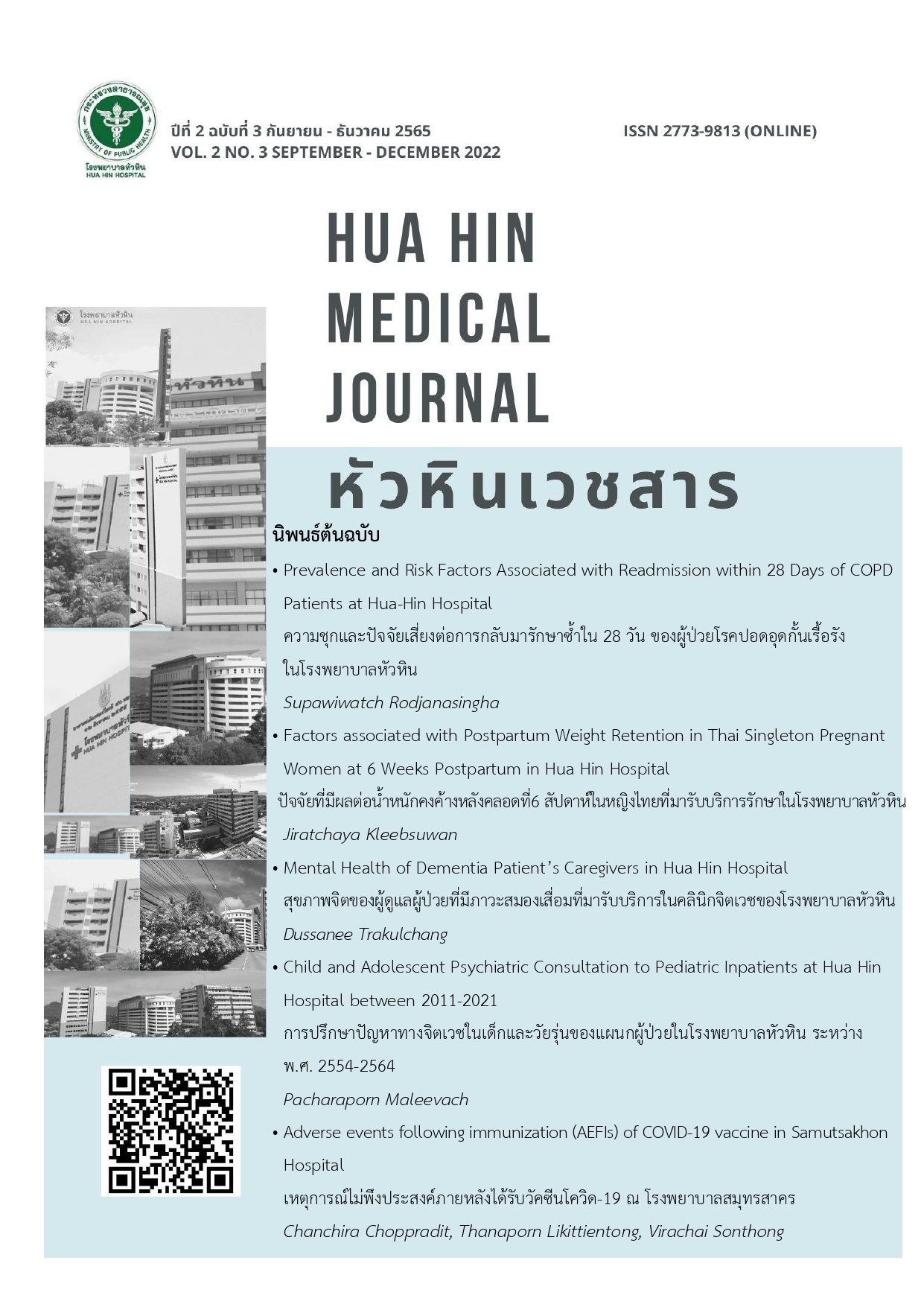Factors associated with Postpartum Weight Retention in Thai Singleton Pregnant Women at 6 Weeks Postpartum in Hua Hin Hospital
Keywords:
postpartum weight retention, pregnancy weight gain, Postpartum follow-up, pregnant womanAbstract
Abstract
Background: Obesity is currently a major problem with increasing epidemiological trends worldwide, including in Thailand. Obesity creates impacts on human beings, both at the individual and state level, as it affects human health, society and economic status. Generally, when women become pregnant, their weight will increase quickly and many cases of acquired weight have remained after childbirth. If women do not take care of themselves correctly, the remaining weight will ultimately grow into overweight and obese.
Objective: The objective of this analytical research was to examine factors affecting postpartum weight retention at 6 weeks postpartum.
Methods: The sample was a medical record of 908 Thai women who were attended antenatal care, maternity visits and postpartum follow-up at Hua Hin Hospital between October 1, 2018 and September 30, 2021. Data were analyzed using Percentage, Mean, and Standard deviation, t-test, one-way ANOVA, Correlation and Stepwise multiple regression analysis.
Results: The results showed that the postpartum weight retention at 6 weeks of Thai women who received antenatal care, maternity care and postpartum follow-up at Hua Hin Hospital had an average weight of 2.31 kg (S.D.= 4.54). According to the pre-pregnancy characteristics, during pregnancy and mode of delivery found that the parity, pre-pregnancy body mass index and pregnancy weight gain had an effect on the residual weight at 6 weeks postpartum (P<0.05). Obtained result from the multiple regression analysis according to the order of the variables entering the equation was statistically at the significant level of 0.01. The pregnancy weight gain was predicted by 44.2% at 6 weeks of postpartum weight.
Conclusion: From the results of this research, the author suggested that the factors affecting the postpartum weight retention, especially pregnancy weight gain should be monitored. Attention to the primigravida women and women with a normal pre-pregnancy body mass index should be the priority.
Keywords: Postpartum weight retention, Pregnancy weight gain, Postpartum follow-up, Pregnant woman
References
Obesity and overweight [Internet]. Who.int. 2022 [cited 1 April 2022]. Available from: https://www.who.int/news- room/fact-sheets/detail/obesity-and- overweight
2Most Obese Countries 2022 [Internet]. Worldpopulationreview.com. 2022 [cited 1 April 2022]. Available from: https://worldpopulationreview.com/ country-rankings/most-obese- countries
Fryar CD, Carroll MD, Afful J. Products - Health E Stats - Prevalence of Overweight, Obesity, and Severe Obesity Among Adults Aged 20 and Over: United States, 1960–1962 Through 2017–2018 [Internet]. www.cdc.gov. 2021. Available from: https://www.cdc.gov/nchs/data/hest at/obesity-adult-17-18/obesity- adult.htm
Gunderson EP. Childbearing and Obesity in Women: Weight Before, During, and After Pregnancy. Obstetrics and Gynecology Clinics of North America. 2009;36(2):317-32.
Turner M, Layte R. Obesity levels in a national cohort of women 9 months after delivery. American Journal of Obstetrics and Gynecology. 2013;209(2):124.e1-7.
Djaković I, Soljačić-Vraneš H, Kuna K. Weight Gain in Pregnancy and Weight Retention after Birth. Open Access Macedonian Journal of Medical Sciences. 2019;7(4):614-6.
Yaw YH, Shariff ZM, Shahdan JB. Pre- pregnancy BMI and Gestational weight gain are associated with 6 months Postpartum weight retention. International Journal of Public Health and Clinical Sciences. 2017;4(4):112-25.
Johnson D, Madsen C, Banaag A, Krantz DS, Koehlmoos TP. Pregnancy Weight Gain and Postpartum Weight Retention in Active Duty Military Women: Implications for Readiness. Mil Med. 2021.
Nagpal S, Chandrashekarappa S, Chakrashali S, Rakshitha J, Mysore Ramaiah N. Exploring the hidden part of the iceberg: Post-partum weight retention among mothers and its association with sociodemographic, cultural and behavioural factors. Clinical Epidemiology and Global Health. 2021;9:62-8.
Subhan FB, Shulman L, Yuan Y, McCargar LJ, Kong L, Bell RC. Association of pre- pregnancy BMI and gestational weight gain with fat mass distribution and accretion during pregnancy and early postpartum: a prospective study of Albertan women. BMJ Open. 2019 Jul;9(7):e026908.
ตรีภพ เลิศบรรณพงษ์.น้ำหนักตัวมารดากับการ ตั้งครรภ์:ปัจจัยที่สูติแพทย์อาจมองข้าม.เวช บันทึกศิริราช.2551;1(2):81-90.
ภาวะอ้วนในหญิงตั้งครรภ์ (obesity in pregnancy) – department of obstetrics and gynecology faculty of medicine Chiang Mai university [Internet]. Cmu.ac.th. [cited 2022 Apr 1]. Available from: https://w1.med.cmu.ac.th/obgyn/lec turestopics/topic-review/5619/
Hu FB. Overweight and Obesity in Women: Health Risks and Consequences. Journal of Women’s Health. 2003 Mar;12(2):163–72.
Cunningham FG. Obesity; in Willams obstetrics. 26th ed. New York:McGraw Hills;2022.p.902-911.
Templeton A. Obesity and Women’s Health. Facts, Views & Vision in ObGyn [Internet]. 2014 [cited 2022 Apr 1];6(4):175–6. Available from: https://www.ncbi.nlm.nih.gov/pmc/a rticles/PMC4286855
มิ่งกมล อุตตสุรดี, สุรีย์พร กฤษเจริญ, ศศิธร พุมพวง. ปัจจัยที่มีอิทธิพลต่อความสุขของหญิง ตั้งครรภ์. Songklanagarind J Nurs. 2563; 40(3) :116-27.
Hollis JL, Crozier SR, Inskip HM, Cooper C, Godfrey KM, Harvey NC, et al. Modifiable risk factors of maternal postpartum weight retention: an analysis of their combined impact and potential opportunities for prevention. Int J Obes (Lond) [Internet]. 2017;41(7):1091–8. Available from: http://dx.doi.org/10.1038/ijo.2017.78
กรมอนามัย. คู่มือการฝากครรภ์สําหรับบุคลากร สาธารณสุข. พิมพ์ครั้งที่ 1. นนทบุรี: สํานัก ส่งเสริมสุขภาพ กรมอนามัย กระทรวง สาธารณสุข; 2565.
Webber J, Charlton M, Johns N. Diabetes in pregnancy: management of diabetes and its complications from preconception to the postnatal period (NG3). Br J Diabetes Vasc Dis [Internet]. 2015;15(3):107. Available from:http://dx.doi.org/10.15277/bjdv d.2015.029
Casey B. Gestational diabetes - on broadening the diagnosis. N Engl J Med [Internet]. 2021;384(10):965–6. Available from: http://dx.doi.org/10.1056/NEJMe2100902
สมบูรณ์ บุณยเกียรติ.พฤติกรรมการดูแลตนเอง ด้านโภชนาการในสตรีตั้งครรภ์ที่เข้ารับ บริการฝากครรภ์ ที่โรงพยาบาลเจ้าพระยา อภัยภูเบศร จังหวัดปราจีนบุรี [Internet]. He02.tci-thaijo.org. 2022 [cited 14 September 2022]. Available from: https://he02.tcithaijo.org/index.php/ ppkjournal/article/view/99827
Shao H, Hwang L, Huang J, Hsu H. Postpartum Weight Retention Risk Factors in a Taiwanese Cohort Study. Obesity Facts. 2018;11(1):37-45.
Williams Textbook Of Endocrinology. S.L.: Elsevier; 2019.
Cunningham FG. Puerperium; in Willams obstetrics. 26th ed. New York:McGraw Hills;2022.p.634-86.
Dalrymple K, Uwhubetine O, Flynn A, Pasupathy D, Briley A, Relph S et al. Modifiable Determinants of Postpartum Weight Loss in Women with Obesity: A Secondary Analysis of the UPBEAT Trial. Nutrients. 2021;13(6):1979.
Downloads
Published
Versions
- 2023-06-22 (2)
- 2023-01-09 (1)
How to Cite
Issue
Section
License
Copyright (c) 2023 Hua-Hin Hospital

This work is licensed under a Creative Commons Attribution-NonCommercial-NoDerivatives 4.0 International License.
บทความที่ได้รับการตีพิมพ์ในวารสารหัวหินเวชสาร เป็นลิขสิทธิ์ของโรงพยาบาลหัวหิน
บทความที่ลงพิมพ์ใน วารสารหัวหินเวชสาร ถือว่าเป็นความเห็นส่วนตัวของผู้เขียนคณะบรรณาธิการไม่จำเป็นต้องเห็นด้วย ผู้เขียนต้องรับผิดชอบต่อบทความของตนเอง






